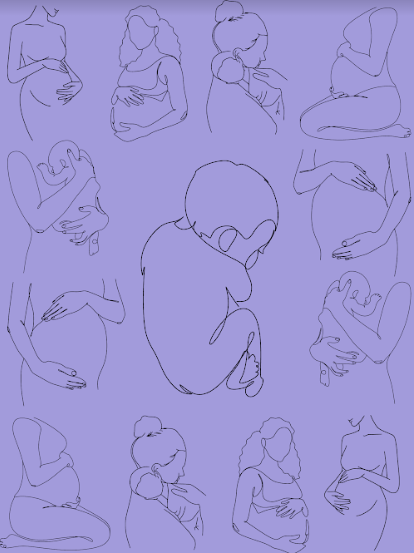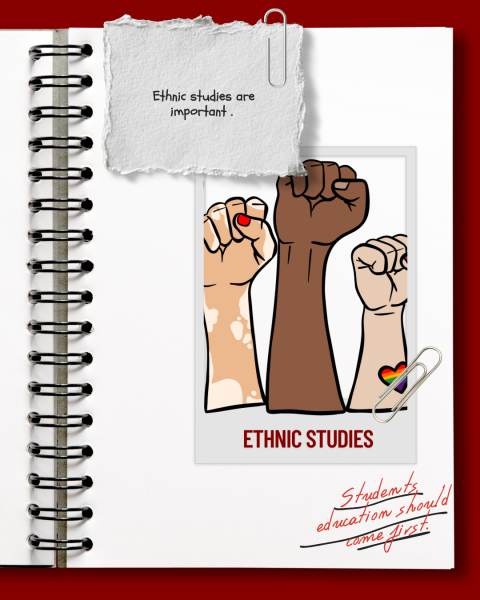The double standards of teen parenthood

Brianna Bustamante (made with Canva)
Being a young parent comes with its challenges and stereotypes, however, teen mothers and fathers handle a pregnancy differently.
Imagine for the past few weeks you’ve been feeling sick every morning, extreme tiredness, and physically unwell. You decide to take a pregnancy test, and it reads positive but what now? What about school? What about your parents? You’re only a teenager.
Many describe being pregnant as a gift, but it only applies in certain circumstances.
As a society, we have assigned negative stereotypes to teen parents — specifically teen moms.
Teen parents face these negative stereotypes everyday, shamed and constantly put down by everyone around them.
In the media, and especially on TV, teen pregnancy has been shamed repetitively. We see the same situation repeat itself: the relationship of the teen parents is portrayed as broken or abusive, the girl finds out she is pregnant, she is shamed by others, and ends up as a teen mom. Usually, the father is absent because he decides teen parenting is not for him. Sometimes the mom decides to leave him out of it because she knows what is better for the life of her child.
The way the media treats teen pregnancy leads us to believe teen pregnancy is a negative situation. This leads us to view the parents in different perspectives. It is normal for the mother to be shamed and told her life is over, and it is also normal for the father to think of leaving and never taking part in the life he helped create. This has also led us to believe many different stereotypes for both teen mothers and teen fathers.
A common theme between all these stereotypes is that women are punished and men get away with everything. It takes two people to get pregnant, but the mother is the one taking all of the hate in these situations.
Teen moms are often left to deal with the pregnancy alone.
Laura Martinez, SAUSD Teen Parent Liaison said, “If there is support from the father of the baby and the girl’s parents, it is a more positive situation. When there is no support or acknowledgment from the father – that is hard too. When parents are upset and not supportive, this situation puts a strain on the entire family.”
Not getting the support of the ones near a soon-to-be teen mother is something very common in teen pregnancies. No support also leads to other problems in teenage pregnancy.
“There is also the factor of whether or not they are considering terminating the pregnancy –that brings a whole lot of issues as well. Sometimes the teen mom is considering that as an option and the parent is against it. Sometimes, the father of the baby wants the teen mom to terminate the pregnancy and she does not,” said Martinez.
Controversy, fear, and shame come with teenage pregnancy and results in three typical outcomes– early marriage, adoption, or abortion. These are usually the only options for some people, whether it be over religion, morals, or because of the teens’ parents’ influence.
When asked if abortion was a thought, an anonymous teen dad said, “My life was starting. I had plans, but I know everyone considers it; they just don’t say it out loud.”
What about the mother’s opinion? The one that deals with the whole pregnancy, who deals with the aftermath, physically and emotionally. Fathers leaving in teenage pregnancy is considered normal; it is normal for the father to want to leave and for him to bring up terminating the pregnancy, but what about the mother who has to deal with the consequences?
“Imagine having to go to high school, and sit in small desks, and not fitting because of your tummy. Not having money for maternity clothes or not being able to do PE because you are too far along or trying not to get caught up in the crowd at lunchtime to get your lunch. Or having to suddenly leave class because you feel nauseous, or leaving class to pump your breast milk,” said Martinez.
Though teen mothers might feel unsupported, students who become pregnant are entitled to resources.
Martinez said, “When a student is expecting, I provide support services. I will contact the student, most times meet initially in person, and provide my contact information. The district will provide maternity leave and send a teacher to the home so they can keep up with their classwork. Maternity leave is three weeks before the due date and four weeks after. I send out monthly newsletters, mostly weekly texts on various community resources. We also have diaper distributions. One of the biggest ways we support parenting students is childcare. We have two childcare centers, one at Lorin Griset Academy and the other at Valley High School. I will also work with the student and counselor in order to make accommodations to students’ schedules– for example a late start or early dismissal.”
If you create life then you should be part of that life. A teenage pregnancy for most is unexpected; most soon-to-be teen parents do not know how to manage their pregnancy. With being lost and not knowing what to do, they are also shamed by everyone around them.

I have a rabbit, I love listening to music, and my favorite color is white.




































